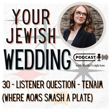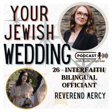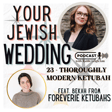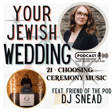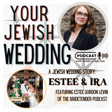
18 - Bedecken
Bedeck the halls? Nah. Bedeck the BRIDE!
(But seriously, what the heck is a bedecken?)
Chat with Rabbi LeighAnn about the Jewish custom of veiling the bride, one of the most underrated Jewish wedding customs!
Don't forget - you can reach me (Rabbi LeighAnn) any time at www.yourohiorabbi.com or everyonesfavoriterabbi.com or rabbileighann.com !
Fill out the contact form there if you'd like to work with me on your wedding. There are SO many options, from Ketubah consulting to ceremony planning. If there's something you have in mind, don't hesitate to ask - I'm here to help!
IG: @yourohiorabbi
Podcast IG: @yourjewishweddingpodcast
Send questions for me to answer on this podcast to:
yourjewishweddingpodcast@gmail.com
Hope to see you next time! Remember - there is ALWAYS more learning to do!
<3 Rabbi LeighAnn
Show notes:
https://www.chabad.org/library/article_cdo/aid/313719/jewish/The-Jewish-Veiling-Ceremony-Bedeken.htm
https://ketubahazoulayart.com/bedeken-ceremony/
https://sacred-texts.com/jud/gm/gm10.htm
https://www.smashingtheglass.com/badeken-jewish-wedding-traditions-explained-4/
https://ritualwell.org/?s=bedecken
https://en.wikipedia.org/wiki/Baal_Shem_Tov
https://thewoksoflife.com/how-to-do-a-chinese-wedding-tea-ceremony/



